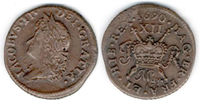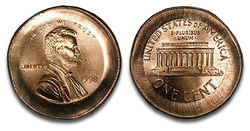Loose change
Coins have been used by societies for thousands of years as a form of currency. Yet, prior to being exchanged for monetary value, coins, or "coyns" as the were known, were trinkets sold in high-rise novelty stores. The most popular of these were small disks employed by somewhat crazed uncles performing the "what's-that-behind-your-ear" trick. While some coyns could be had for as little as a tit-mouse or fat hen, more elaborate ones cost as much as two sheep or an ox. Generally, livestock are known to be horrible currency to carry into high-rise buildings of any sort, so it wasn't long before coyns themselves were used in trade.
Times they are a CHANGE-in[edit | edit source]
Social debutantes from the upper echelons of Egyptian culture began using coyns as a fashion statement. These coyns were punctured with a rivet and attached the the earlobe via a small metal hoop. Anthropologists have theorized that these early earrings were status symbols used to show social status. Marginally paid social workers tend to believe, and probably more accurately, that they were instead used to discourage somewhat crazed uncles from performing silly parlor tricks in attempts to cop a feel.
Coyns remained fashionable jewelery for nigh on a century before the Visigoths overthrew the Egyptian capitol of Barcelona in the Great Ransacking of Things That Were Your Fathers Which Our Fathers Envied invasion. The Visigoths, who are notoriously well known for having speech impediments, forever changed the the spelling of coyn to the familiar "coin" of today. Abcedarians attribute the change to their soft-palate. A gathering of middle school libriarians concluded it was most probably due to a particularly horrible contestant in the Fourteenth Annual Visigoths Invitational Spelling Bee who's quite bitchy mother held the position of Master Judge of Ceremonies in the same event.
It was also at this time that the primary use of coins was altered. As was fashionable in Visigoth circles, young warriors wore brightly colored pantaloons which were tailored not only with fetching lace cuffs but also deep, woven pockets. These pockets were used to hold the severed ears of their conquered foes after a battle. It was these pockets that were soon filled with the ears and coyns of Egyptian debutantes. In time, rotting ears gave way to jingly coins.
The Revolution[edit | edit source]
Over the span of hundreds of years the use of pockets spread around the known globe. The primary force behind the trend was the ironic fact that the jingling sound of coins was most pleasing to the ear. Eastern cultures preferred to hold their coins from a pouch strapped to their belt. Historians deduced that this was probably because Eastern peoples tended to find an ear in their pocket on occasion. Bud Larson, a gym teacher at Wilbur Wright Senior High School, correctly determined it was the result of "some gay-ass scrotum envy".
The real movement in pocket technology was born during the American Revolution in the heart of Pennsyltucky. Founding father, Benjamin Franklin, among other things, was both a expert tailor and somewhat crazy uncle. He is responsible for many inventions, but most noteworthy to the history of coins were the sixpence to four-quarters auto-pocket and the "what's-that-beside-your-nipple" parlor trick.
This new parlor trick became so popular so quickly that nations moved to enact laws against it's performance. Societies at large were instantly at risk to it's pervasive and cunningly subversive nature. Young men were warned against the dangers of performing such tricks and threatened with afflictions such as the blindness and erectile dysfunction that plagued the trick's creator. Young women who actually enjoyed having the maneuver performed on them repeatedly were labeled loose women and on several occasions tried and burned as witches.
Government action against the populace was swift and harsh. The United States, France, England, and Nepal established the first Congregation of Associated Smart and Intelligent Nations Organization (CASINO) in less that a year. The wisest of the wise among them created a three-pronged approach to eliminating the problem.
Defining the Problem[edit | edit source]
The first act of the CASINO was to define the epidemic in simplest terms. To dissuade common folk from abandoning their Lutheran upbringing they coined the phrase "loose change" to attach the idea of these coins to the same slutty "loose women" which caused such a stir in the first place. In doing so, they also managed to coin the phrase "to coin a phrase" which was deemed a sign from God himself that their actions were just.
This did not pan out as well as was hoped for loose women tended to be those most fancied at parties. Tactics soon changed to advertisements showing the horrific diseases that one could contract from loose change.
Removing the Culprit[edit | edit source]
Since there was so much loose change on the market government acted to immediately require churches to pass a fine plate or impressive piece of crockery from person to person so they could anonymously deposit any of the unclean coin during an eyes-closed prayer. Not only did this have a chilling effect on sermon attendance, it mostly succeeded only in shifting loose change ownership from common-folk to preacher. As a result, the CASINO created several establishments for removing loose change from circulation directly.
The warehouses created for people to discard their coins were not the kinds of places common-folk wanted to congregate.
It was decided in the second meeting of the Congregation of Associated Smart and Intelligent Nations Organization that these warehouses should be decorated to trick people into discarding their loose change willingly. The warehouses were then renamed Casinos in honor of the grand committee that created them. They were then decorated with devices that flashed pictures of fruit, diamonds, and the quite attractive number seven. This move was considered a success.
Lastly, in what is known as a precursor to our modern UNICEF program, the Congress established Halloween as a national holiday. On this day children from all over the world were commanded to roam from house to house collecting loose change from those remaining few who refused to go to casinos or churches. Kids, being the little shits they are, were embarrassed to perform this task and took to hiding their faces behind paper cut-outs made to look like Benjamin Franklin. And as turned out, people who weren't going to visit a casino sure as hell weren't going to give loose change to kids. Crafty folks who knew a thing or two about children, began bribing the kids with candy. Within three short years the intent of the holiday was lost forever.
Loose Change Today[edit | edit source]
The landscape of our world is now littered with the remnants of failed policy to eliminate loose change. A national holiday is celebrated every year while the masses remain ignorant to it's origins. Casinos, while still succeed in taking in more loose change than they dispense, have become a corrupt version of what they were originally intended. In fact, governments have become so corrupt that they have become the world's largest producer of loose change. Although they do try to hide this fact by pretending them to be candy factories otherwise known as mints.
However, one cannot consider all lost. Despite the fact that Benjamin Franklin was the first President of the United States, his likeness has forever been banned from appearing on the face of any coin. Parlors are not only a thing of the past, the average citizen can go days on end without hearing the question "What's that beside your nipple?" Today, loose change is worth so little it will only be found in the pockets of desperate, sex-starved perverts who roam from peep show to peep show.



